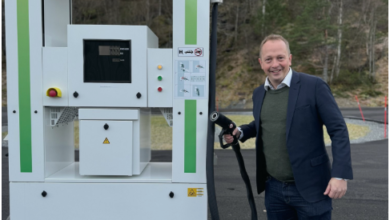ACEA and T&E call for 1000 hydrogen trucks refuelling stations by 2030
Both bodies urged the EC for binding targets for charging and refuelling infrastructure for zero-emission trucks

The European Automobile Manufacturers’ Association (ACEA) and Transport & Environment (T&E) have jointly called European Commission for deploying hydrogen stations and electric charging stations for trcuks in the EU, H2 Bulletin reports.
Both bodies urged the European Commission in a joint letter yesterday to deploy 300 hydrogen refuelling stations suitable for heavy-duty vehicles by 2025, reaching about 1,000 by 2030. For electric vehicles, both bodies call to deploy 11,000 charging points for electric trucks across the EU by 2025, reaching 42,000 by 2030.
They highlighted the fact that there is currently almost no zero truck-specific charging station in operation. However, the proposed targets seem ambitious, though it is pivotal to achieve the goals of the European Green Deal.
The call comes ahead of the expected review of Europe’s Alternative Fuels Infrastructure Directive (AFID) this year. Both associations requested the commission to make AFID fit for zero-emission trucks and buses, with binding targets for infrastructure across the member stated to ensure the swift transition to zero-emission vehicles. Without proper refuelling infrastructure, fleet owners will not be convinced to invest in these vehicles.
A hydrogen refuelling station for trucks should have a daily capacity of at least 6 tonnes of H2. Compressed hydrogen at 350 bar and 700 bar and liquefied hydrogen refuelling technology should be considered.
They emphasised that the commission should consider the issue of space, parking as zero-emission vehicles have specific requirements for refuelling and charging. These stations should be installed at places such as truck depots, logistics hubs, public sites in urban areas, and highway corridors.
Martin Daum, ACEA Commercial Vehicle Board Chair and CEO of Daimler Truck AG, said, “Our industry is fully committed to the Green Deal and therefore carbon-neutral road freight transport by 2050 at the latest.”
William Todts, executive director at Transport & Environment. “The transition to zero-emission trucks is happening, and it is time for the European Commission to wake up.”
